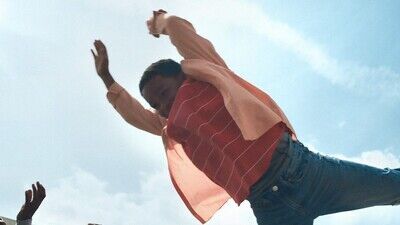When tragedy strikes on the grounds of Cabrini-Green, a child’s life is lost in the crossfires of criminal activity, and the boys are forced to reckon with the psychic and physical consequences that are born in its wake. And so the title, “We Grown Now,” is less an observation of the process of aging and more a eulogy of lost innocence. It’s a document of Black life through the eyes of children who, on account of the sociopolitical factors of race and class, are forced to deal with adult problems and complexities far before their white counterparts. It’s a portrait of the beauty of youth and the heartening passion of childhood friendships but also a mournfully pointed finger at the fragility of these sacred pillars of upbringing.
However, “We Grown Now” is not overly saccharine or pitiful. It’s a film defined by streaks of sunshine and attentive detail to seemingly unremarkable moments of child life. Utilizing location at every feasible scale, from the wideness of the city of Chicago to the minuteness of frames hanging on cinder block hallways, Baig’s direction plays a symphony with your heartstrings at every turn. Romanticized images of Black girls hula hooping on tar-black pavement, close-ups of balls bounced against brick walls in bored, passage-of-time play, and hazy sunlight through school bathroom meetups (when you should be in class) recall the mundane with nostalgic reverence.
The film’s geographical core of Cabrini-Green is the most infamous of Chicago’s many historied housing projects, and its filmic legacy is most likely to awaken memories of the dangerous, dilapidated corridors and crumbling, graffiti stained infrastructure in “Candyman,” a film that takes place in the same year of “We Grown Now.” While these are vastly different films, each laudable in their own right, their depictions are clear dichotomous representations of reputation and reality. Yet, “We Grown Now” doesn’t sidestep the underbelly of its locale. While utilizing it as a biographical moment in the lives of Malik and Eric, it also permits a full, real spectrum of its history: both the plague of crime’s collateral damage and the play and plainness of an overall happily lived life. Though Jay Wadley’s string-heavy score sometimes tips into oversentimentality alongside a few heavy-handed moments of dialogue, “We Grown Now” is largely firmly planted in authenticity.

